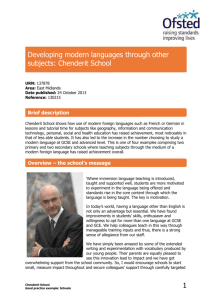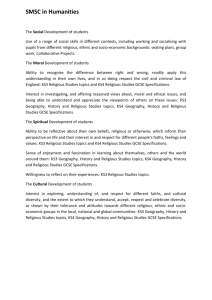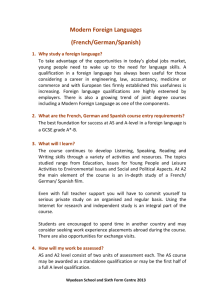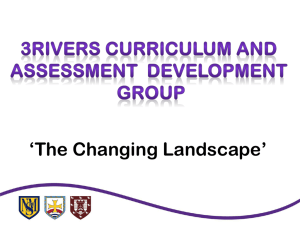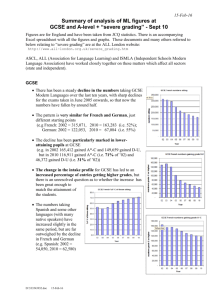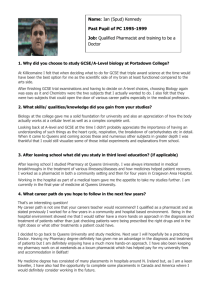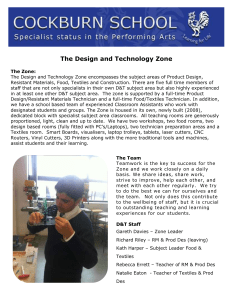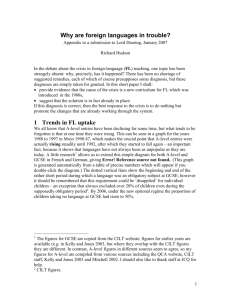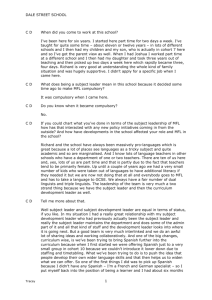Languages-profile-fo.. - Nailsea Community School
advertisement
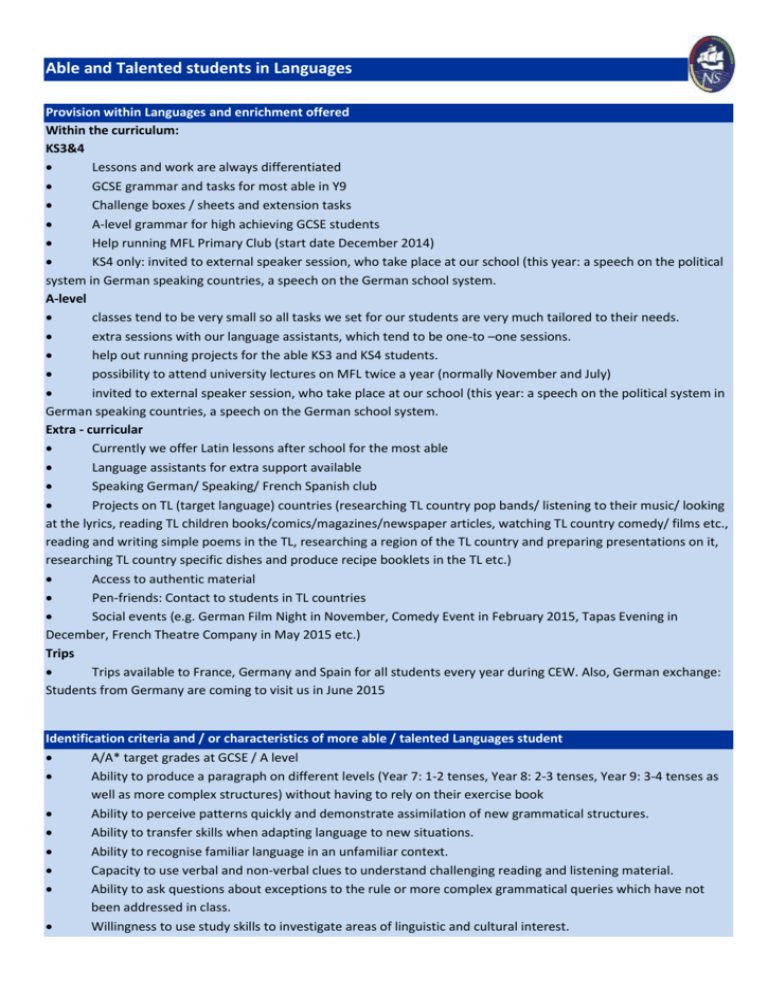
Able and Talented students in Languages Provision within Languages and enrichment offered Within the curriculum: KS3&4 Lessons and work are always differentiated GCSE grammar and tasks for most able in Y9 Challenge boxes / sheets and extension tasks A-level grammar for high achieving GCSE students Help running MFL Primary Club (start date December 2014) KS4 only: invited to external speaker session, who take place at our school (this year: a speech on the political system in German speaking countries, a speech on the German school system. A-level classes tend to be very small so all tasks we set for our students are very much tailored to their needs. extra sessions with our language assistants, which tend to be one-to –one sessions. help out running projects for the able KS3 and KS4 students. possibility to attend university lectures on MFL twice a year (normally November and July) invited to external speaker session, who take place at our school (this year: a speech on the political system in German speaking countries, a speech on the German school system. Extra - curricular Currently we offer Latin lessons after school for the most able Language assistants for extra support available Speaking German/ Speaking/ French Spanish club Projects on TL (target language) countries (researching TL country pop bands/ listening to their music/ looking at the lyrics, reading TL children books/comics/magazines/newspaper articles, watching TL country comedy/ films etc., reading and writing simple poems in the TL, researching a region of the TL country and preparing presentations on it, researching TL country specific dishes and produce recipe booklets in the TL etc.) Access to authentic material Pen-friends: Contact to students in TL countries Social events (e.g. German Film Night in November, Comedy Event in February 2015, Tapas Evening in December, French Theatre Company in May 2015 etc.) Trips Trips available to France, Germany and Spain for all students every year during CEW. Also, German exchange: Students from Germany are coming to visit us in June 2015 Identification criteria and / or characteristics of more able / talented Languages student A/A* target grades at GCSE / A level Ability to produce a paragraph on different levels (Year 7: 1-2 tenses, Year 8: 2-3 tenses, Year 9: 3-4 tenses as well as more complex structures) without having to rely on their exercise book Ability to perceive patterns quickly and demonstrate assimilation of new grammatical structures. Ability to transfer skills when adapting language to new situations. Ability to recognise familiar language in an unfamiliar context. Capacity to use verbal and non-verbal clues to understand challenging reading and listening material. Ability to ask questions about exceptions to the rule or more complex grammatical queries which have not been addressed in class. Willingness to use study skills to investigate areas of linguistic and cultural interest. Capacity to notice new features and structures and to develop constructions on their own. Aural ability to grasp the gist of spoken language without having to know every word. Capacity to use appropriate language in different contexts and make wider links. Capacity to be accurate and precise in their use of language and to enjoy the new expressive possibilities a different language provides ASPIRE: Where can the more able and talented students within Languages aspire to progress Languages are a very valued subject with employers and universities and it is therefore highly recommended to at least study a language up to GCSE. Why studying a language: 1. Better job perspectives: Companies who plan to expand into overseas market are constantly looking for bilingual staff. 2. Universities: A lot of universities, including Russell Group Universities, like to see when students have studied a language for A-level and take students on with such qualifications before others. This is also the case for courses like law, architecture and medicine, and not just those courses with a direct link to a language. Modern Languages can be studied at Russell Group Universities in combination with many other subjects such as business, medicine, law, art, history, politics, architecture, tourism, computing and science. 3. Experience new cultures / Travel and Leisure: The world is a cauldron of rich and interesting cultures. Learning a new language allows you to access many different cultures across the world. Learning a new language at A-level opens up a world of new opportunities. You can confidently speak to locals and other travellers. 4. Possible Careers: Our links with the European Community are developing constantly and the ability to speak a foreign language is becoming increasingly important. Careers in Modern Foreign language include: Working for the EU or the UN / International banking / Import/ export trade / Business / Airlines / Management positions / Tourism (hotels, restaurants etc.) / Journalism / Public relations / Translating / Interpreting / International law / Architecture / ICT / Publishing / Teaching / Communication Technology BELIEVE: In order to achieve these aspirations students should: • Attain KS3 (level 7+), KS4 &5 (A/A* GRADES) through... • Regularly study vocabulary • Study the grammar of the TL • Make use of authentic resources • Get into contact with people from TL speaking countries • Volunteer to help out within our extra – curricular offers • Attend social events we offer within the department • Join trips and exchanges offered to them • Practise speaking, listening, reading and writing skills regularly in order to achieve good grades SUCCEED: Success stories from Nailsea school Students have attained A/A* grades at Nailsea school. More able and Talented coordinator for this subject D Micic, DMicic@nailseaschool.com
